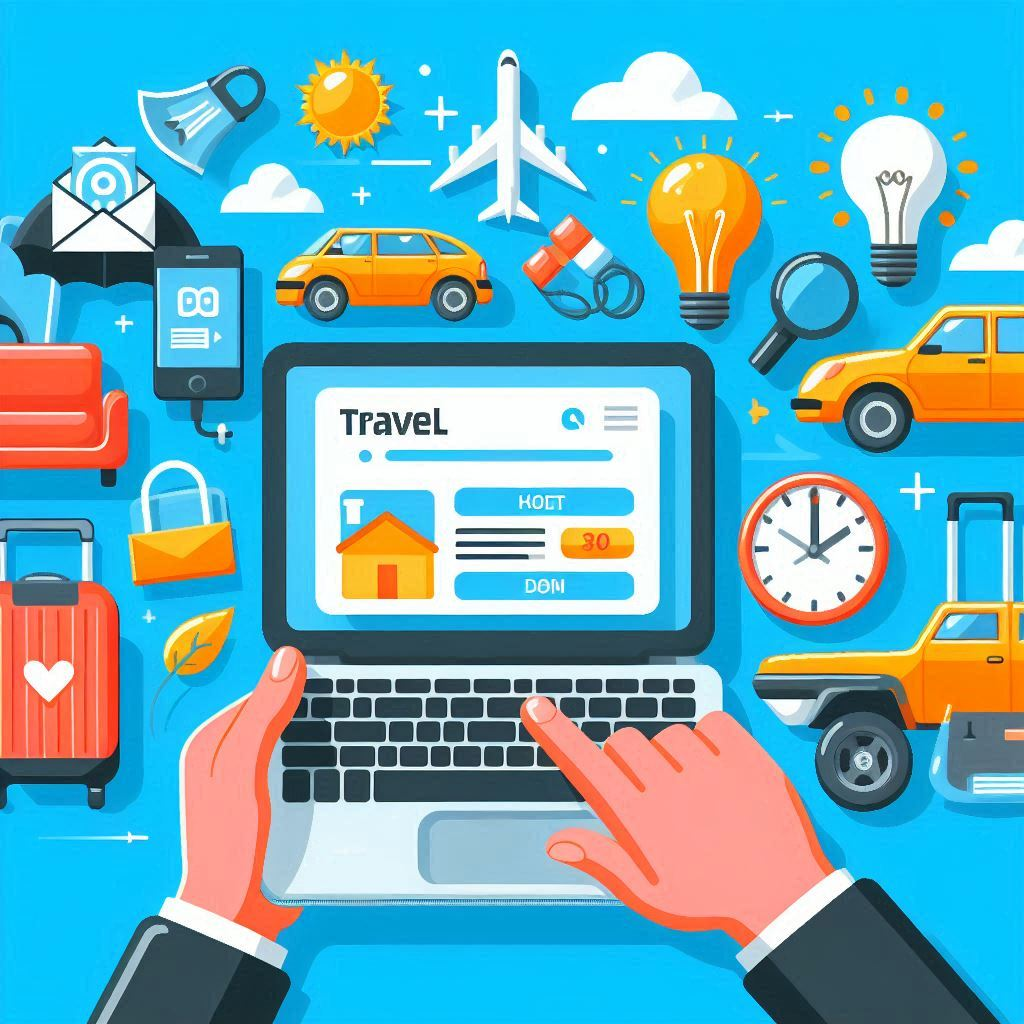
In the digital age, the internet for travel has revolutionized how individuals plan, book, and experience their journeys, marking a significant shift from the traditional reliance on physical travel agencies. This transformation is powered by the proliferation of online booking platforms, artificial intelligence, and advanced digital technology, which together have enhanced customer service and user experience. Understanding this shift is important because it recognizes how it impacts travelers and the travel industry at large and appreciates the broader implications for consumer behavior and digital innovation.
The article will explore the decline of traditional travel agents and the corresponding rise of online travel platforms, highlighting the advantages of using the Internet for travel planning. It will delve into how digital technology, especially artificial intelligence, has facilitated this shift, offering insights into the emergence of new travel technologies that further streamline the booking and travel process. Through examining these developments, the article aims to provide a comprehensive overview of how the Internet is reshaping the travel industry, moving it toward a future where efficiency, convenience, and personalized service prevail.
The Decline of Traditional Travel Agents
Traditional travel agents have faced significant challenges over the past decade, with their role in the vacation rental landscape rapidly diminishing. This decline is evident in the substantial decrease in employment within the sector. From 2014 to 2024, employment of travel agents is projected to decline by 12 percent. This reduction is largely attributed to travelers' increasing capability to research vacations and book their own trips via the internet, particularly through mobile devices.
Statistics on the Decline
The impact of digital technology on traditional travel agencies is stark. For example, during the COVID-19 pandemic, the travel industry saw unprecedented disruptions. According to a survey by the American Society of Travel Advisors, 93% of travel agencies reported a business income decrease of at least 75% compared to 2019. Furthermore, significant layoffs occurred, with 75% of agencies with W-2 employees having laid off or furloughed at least one employee. Major travel agency businesses also faced closures, with notable companies like the Australian travel agency Flight Centre closing 421 out of 740 stores.
Comparison with Pre-Internet Era
Before the advent of the internet, traditional travel agents played a dominant role in travel distribution. High street travel agencies were once the primary method for booking travel, offering personalized services and expert advice. However, the rise of online travel agencies (OTAs) and direct distribution through airlines and hotels' websites has revolutionized the industry. This shift has forced many traditional agents to adapt or cease operations. For instance, Thomas Cook has integrated digital innovations such as online bookings and virtual reality experiences in stores to maintain relevance in this new digital era.
The transition from traditional travel agency services to internet-based booking platforms illustrates a significant shift in consumer behavior and industry standards, emphasizing the need for traditional agencies to adapt to the evolving digital landscape.
The Rise of Online Travel Platforms
Online travel platforms have dramatically transformed the landscape of travel booking, making it more accessible and efficient for consumers and businesses alike. These platforms leverage digital technology to offer a comprehensive array of services, from flight bookings to hotel reservations, often at competitive rates.
Examples of Online Platforms
Online Travel Agencies (OTAs) like Expedia, Booking.com, and Airbnb are prime examples of platforms that have capitalized on the internet to streamline the travel booking process. These platforms not only facilitate direct bookings but also allow users to compare prices, read customer reviews, and manage their travel plans from anywhere in the world. Similarly, niche platforms such as GetYourGuide and Viator specialize in tours and activities, offering unique travel experiences that are bookable online.
Corporate travel has also seen innovation through platforms like TravelPerk, which removes the traditional corporate middleman and allows companies to manage their travel needs directly. This direct management includes everything from booking to compliance with travel policies; all facilitated through user-friendly interfaces.
How They Work
The functionality of these online travel platforms is rooted in their sophisticated use of digital technology. At the core, these platforms operate by aggregating data from various service providers, which allows them to offer extensive inventories and competitive pricing. Users can search for and book travel services in real-time, with features such as price comparison tools, customizable search filters, and secure online payment systems enhancing the user experience.
For corporate clients, platforms like TravelPerk integrate additional layers of functionality, such as policy compliance checks and risk management systems, ensuring that business travels are cost-effective and safe.
Furthermore, the integration of artificial intelligence and machine learning has enabled these platforms to offer personalized recommendations and dynamic pricing, adapting to consumer behavior and preferences to optimize the booking experience.
As these online travel platforms continue to evolve, they are expected to personalize the travel experience further, making efficient use of data analytics to tailor their offerings to individual needs and preferences. This evolution marks a significant shift from traditional travel services to a more dynamic, user-driven approach to travel planning and booking.
Advantages of Using the Internet for Travel Planning
Cost Efficiency
One of the most significant advantages of using the Internet for travel planning is cost efficiency. Online Travel Agencies (OTAs) like Booking.com have been shown to offer substantial savings on bookings. For instance, an analysis revealed that Booking.com typically provides a savings of 11% on flights and 31% on hotel rooms compared to direct bookings with airlines and hotels. This is particularly beneficial for budget-conscious travelers who prioritize economical options. Furthermore, the ability to compare prices across various platforms ensures that travelers can secure the best deals, potentially saving an average of $103.12 on popular flight routes.
Convenience and Flexibility
The convenience and flexibility offered by online travel platforms significantly enhance the travel planning process. These platforms operate 24/7, allowing users to book flights, hotels, and car rentals anytime from anywhere, which is ideal for those with busy schedules or those making last-minute travel arrangements. The use of sophisticated algorithms also aids in personalizing travel itineraries to match individual preferences, whether seeking adventure or cultural experiences. Additionally, integrating AI technology in platforms like GetGoing offers added safety by navigating through lower-risk travel routes and providing emergency support, a critical component for many travelers today.
Online travel services streamline the management of travel arrangements by storing all trip information in user profiles, making it easy to modify or cancel bookings as needed. This self-service approach saves time and reduces the stress associated with travel planning, making it a preferred choice for many modern travelers.
Emergence of New Travel Technologies
The travel industry is witnessing a significant transformation with the emergence of new technologies that enhance the traveler's experience from planning to execution. Two pivotal areas of innovation include artificial intelligence (AI) in travel planning and the use of mobile apps.
AI and Travel Planning
Artificial Intelligence has revolutionized the way travelers plan and book their journeys. AI-powered tools like chatbots and virtual assistants provide 24/7 customer service, offering instant responses to inquiries and assistance with bookings. These tools utilize machine learning algorithms to analyze data from travelers' past behaviors and preferences, enabling hyper-personalized travel recommendations and itineraries. For example, AI can suggest destinations, accommodations, and activities based on the traveler's previous selections and reviews. This level of personalization not only enhances the user experience but also optimizes the planning process, making it quicker and more efficient.
Furthermore, AI's capability extends to dynamic pricing and real-time language translation, which are crucial for cost-efficiency and ease of communication in foreign locales. The integration of AI in travel apps ensures that travelers receive the most relevant and cost-effective options, enhancing satisfaction and engagement.
Mobile Apps and Travel
Mobile applications have become essential tools for modern travelers, providing a one-stop solution for all travel-related needs. Mobile apps offer unparalleled convenience and flexibility, from booking flights and accommodations to receiving real-time navigation and discovering local attractions. Apps like Expedia, Booking.com, and Skyscanner allow users to manage their itineraries, access travel documents, and receive booking confirmations all in one place.
Moreover, the integration of augmented reality (AR) and virtual reality (VR) in travel apps offers an immersive experience by allowing travelers to preview destinations before visiting. AR technology can overlay historical facts over live views of landmarks, while VR enables virtual tours of hotels and attractions, helping travelers make informed decisions.
The continuous evolution of mobile technology in travel is geared towards creating more engaging and seamless experiences. With features like personalized travel guides, instant translations, and easy access to local experiences, mobile apps not only simplify the travel process but also enrich the overall journey.
These advancements in AI and mobile technology are setting a new standard in the travel industry, emphasizing the need for continuous innovation and adaptation to meet the growing demands of tech-savvy travelers.
Conclusion
As we chart the future of travel and its evolving landscape, it's clear that the digital transformation ignited by the internet, artificial intelligence, and advanced mobile technologies has reshaped how we plan and book our journeys and set a precedent for other industries. Specifically, the travel industry's shift towards online platforms like Expedia and Airbnb, which empower consumers with more control and flexibility, mirrors potential changes in sectors like the moving industry. Companies such as WeMove.ai are at the forefront of this transformation, suggesting that the online booking and quoting processes that have revolutionized travel are extending their influence, allowing customers in various sectors to take the reins of their experiences with innovative online tools.
This trend underscores a broader movement towards digital innovation and user-centric services across industries, pointing towards a future where efficiency, personalization, and accessibility are paramount. The implications of these changes extend beyond convenience, signaling a shift in consumer expectations and the role of technology in our lives. As we embrace these advancements, it becomes essential for industries to adapt and innovate, ensuring they meet the evolving needs of a digitally enabled society. The travel industry's journey, from traditional agencies to online platforms, serves as a guiding light, heralding a new era of consumer empowerment and technological excellence.
FAQs
- How have travel agents been impacted by technology?
Technology has revolutionized the role of travel agents by replacing manual booking processes with automated systems like Computer Reservation Systems (CRS) and Global Distribution Systems (GDS). These advancements have made booking more efficient and reduced the likelihood of errors. - What impact has the Internet had on tourism?
The Internet has dramatically transformed tourism by introducing online booking and reservation systems. These platforms allow travelers to easily plan and secure their trips from anywhere using their computers or mobile devices. - What are the benefits of using a travel agent compared to booking online?
Opting for a travel agent over online booking can significantly enhance your travel experience. Travel agents provide personalized service, tailoring your itinerary to fit your interests, budget, and schedule, ensuring a stress-free and optimized trip. - Why is the Internet crucial for travel companies?
The Internet plays a vital role in the tourism industry by offering easy access to information, enabling online bookings, improving customer service via social media and apps, and allowing for personalized travel experiences through data analytics and targeted marketing.

